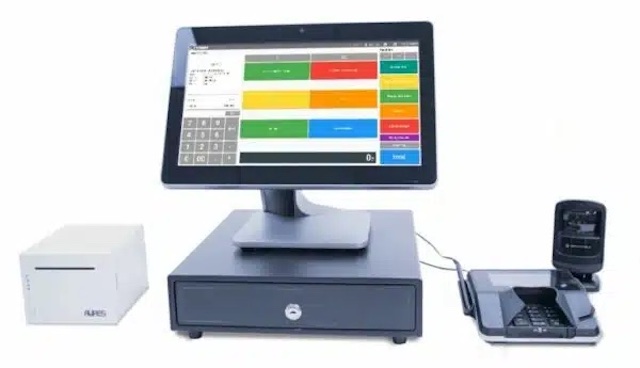KORONA POS, a modern cloud solution for local and franchise ticketing operations worldwide, has shared some insights into one of the most important considerations for operators: which is the best point-of-sale (POS) kit for their business? The right POS kit will maximise efficiency and revenue, by facilitating every transaction and also optimising almost every aspect of the business.
A POS kit is a full set of the point-of-sale hardware elements required to operate a restaurant or retail establishment. Prepackaged or preassembled kits are sold by some point-of-sale businesses, while others will provide a variety of choices so you can choose what suits your industry or particular demands the best.
The basic elements of a POS kit
The elements of a POS kit include the POS screen, which is the display monitor through which users can access their point-of-sale software. Operators use it to handle transactions and returns as well as examine products and log in personnel. Essentially, it serves as the POS kit’s command and communication hub.
Then, there is the credit card reader. Certain POS kits will come with built-in readers that are linked to specific payment processing businesses. Others are connected to the system from the outside. KORONA POS is credit card agnostic, so it can cooperate with the card reader or payment processor which benefits the client the most.
Next, there is the cash drawer. Most companies continue to accept cash and it’s against the law to operate without cash in some places. Connecting a cash drawer to the POS system will enable operators to maintain order and security for their paper currency.
POS kits also include barcode scanners, which can be laser or photo-driven. Barcodes increase accuracy and inventory management efficiency. Scanners range from simple 2-d models that are permanently mounted on countertops to omnidirectional scanners for grocery stores and handheld scanners. In addition, all POS kits should include a printer, as many customers still want a paper receipt instead of an email or text receipt.
Other additions
In addition to the POS kit’s most fundamental components, a number of innovative hardware features are available.
For example, mPOS, or mobile checkout devices. These are mobile checkout gadgets that cashiers or floor workers can use to help consumers while they are away from the checkout. Typically, these are tablets or smartphones that are wifi-connected to the POS equipment. Mobile point-of-sale systems (mPOS) can offer useful checkout flexibility for some organisations.
Another possible addition is an RFID scanner. With the help of radio frequency identification technology, objects can be scanned without the laser and barcode having to come into physical contact. Customers can even put their entire trolley into a bin that reads everything at once thanks to the newest RFID retail technology.
Types of POS kits
The selection of components utilised by various vendors varies somewhat, with some being more basic and others having extra functions.
Firstly, an all-in-one POS kit is ideal for new businesses that require a simple system with built-in processing. While they might reduce some of the hassle and expense of initial setup, their strict payment processing restrictions and higher costs can eventually damage operators. Other businesses might choose a basic, stripped-down POS kit, which is fine for users with a low amount of inventory items and those who don’t rely on barcode scanning.
However, KORONA POS can provide a tailor-built solution, including elements that each particular business requires, such as a stationary laser barcode scanner and a modern credit card reader. KORONA POS allows operators to work with the best payment processor of their choice.
How much do POS kits cost?
Whole POS systems for stores can, on the high end, run into the thousands of dollars per unit before monthly costs. Yet, some vendors let customers use their own desktop computers to run POS software, keeping the price fairly reasonable. Others give out the full POS equipment without any strings attached, but they do demand that the company use their credit card processing.
The straightforward response is that point-of-sale hardware kit prices vary widely. Here is a basic pricing guide using averages and estimates:
- Desktop POS displays – $1200 to $4000
- Mobile POS tablets – $300 to $1500
- Receipt printers and credit card machines – $100 to $300
- Barcode scanners – $30 to $1000
One thing unites all contemporary point-of-sale systems: they are all cloud-based. Business operations are faster and more secure via the cloud. It is also immediately scalable. Users can easily add more units to new locations and see sales data from any place as long as they have a software service subscription.
In terms of interchangeability, payment flexibility, and capability range, POS kits vary. Many point-of-sale providers offer pre-packaged kits that suit small businesses, who favour simple, turnkey systems. These systems’ features and constraints do have certain drawbacks, though.
Several businesses provide POS equipment for free. However, when POS businesses claim to offer free systems, they often are either offering a limited trial, charging greater rates per transaction, or both. While they can be a fantastic alternative for small-scale merchants to get things started, they can also wind up hurting profitability in the long run.
Other companies offer built-in credit card readers, but their retail partners are compelled to use their processing fees. This processing charge might be advantageous for microbusinesses, pop-up stores, and new retailers who don’t have a lot of customers or inventory. Yet if the operator is a business that is processing dozens of transactions per hour, they could be losing significant revenue on those per-transaction fees.
Software is part of the POS Kit
Last but not least, the software features that point-of-sale providers offer are a component of their POS kit. But not all software is created equal.
For everything from inventory management to CRM and loyalty, KORONA POS features the most robust and user-friendly programmes, including native stock optimisation, completely customised KPI dashboards, and industry-leading customer history analysis.
Actionable insights are provided by KORONA Studio to support marketing, merchandising, and promotions. And it becomes even more versatile thanks to integration features for compliance, cash protection, eCommerce, and other uses.
Earlier this month, KORONA POS announced that it has teamed up with Brink’s to provide its customers with a more seamless and secure cash management solution, BLUbeem by Brink’s, which is fully integrated into the POS system.











